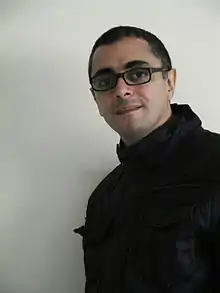Ricardo Mbarkho
Ricardo Mbarkho (25 January 1974 in Beirut, Lebanon), is a Lebanese contemporary artist, researcher, and assistant professor.
Ricardo Mbarkho | |
|---|---|
 Ricardo Mbarkho in 2011 | |
| Born | 25 January 1974 Beirut, Lebanon |
| Nationality | Lebanese |
| Education | Carnegie Mellon University, Pittsburgh PA, USA École nationale supérieure des beaux-arts, Paris, France Institut supérieur des beaux-arts, Beirut |
| Known for | Video art New Media Art Post-conceptual Art |
Mbarkho's work includes multiple outcomes[1] especially digital art practices.[2]
In his digital images,[3] as well as in his time-based work,[4] he investigates multiple questions related to interactivity,[5] language, communication,[6] cultural industries, history of art as well as the visual representation[7] within the sociopolitical sphere.[8] Mbarkho's digital images[9] are made from texts.[10] He uses the computer as a tool to mutate texts into images; the text's binary codes are transposed into a unique corresponding visual.
Mbarkho received his art diplomas from Université Sorbonne Paris Nord, École nationale supérieure des beaux-arts and École supérieure d'études cinématographiques, Paris, and from Institut supérieur des beaux-arts, Beirut. He also completed an exchange study program at Carnegie Mellon University - College of Fine Arts, Pittsburgh, PA, USA.
He lives and works in Beirut.
Publications
- Mbarkho, Ricardo (2016). « L’interdépendance dialectique entre création artistique médiatique et industries culturelles », in Fann wa imarah journal, Issue No. 6, Institute of the Fine Arts – Lebanese University.
- Mbarak, Ricardo (2015). « Pour une double définition des relations entre création médiatique et industries culturelles », in Al Hikma journal, 3rd period, Eighth year, Number 14
- Mbarkho, Ricardo, Dussolier, Claudine, Nawar, Abdo (2014). Presentation of RAMI Platform in Lebanon
- Mbarkho, Ricardo (2012). Response to With the benefit of hindsight, what role does new media play in artistic practices, activism, and as an agent for social change in the Middle East and North Africa today?], Ibraaz online forum
- Mbarkho, Ricardo (2013). « Trauma Stimulated Art, or the Embodiment of Affect in Lebanon: An Allegory », in Traumatic Affect. Cambridge Scholars Publishers
- Mbarkho, Ricardo (2012). « On New Media and Creativity in Lebanon », Leonardo, Journal of the International Society for the Arts, Sciences and Technology (Leonardo/ISAST), Volume 45, Numéro 2, The MIT Press
- Mbarkho, Ricardo (2011). On New Media and Creativity in the Lebanese Setting: 2008–2011, published by The MIT Press in Leonardo Electronic Almanac (LEA) (Leonardo/ISAST)
- Mbarkho, Ricardo (2011). Lecture in « Conferences on the History and the Future of the Internet » – WJ-SPOTS
- Mbarkho, Ricardo (2010). « A different kind of media creativity in the Lebanon », in Cultures and Globalization Series 2009 : Cultural Expression, Creativity & Innovation. SAGE Ed.
- Mbarkho, Ricardo (2008). Introduction to Art and New Media in the Arab States, with a case-study of Lebanon, in Visual Narratives from Arabia – Online Master Module on Art, Design and Technology. © UNESCO
References
- Windows Upon Oceans – Cultural Observatory of the Middle East - Artos Foundation. Cyprus, 2009.
- TURBULENCES VIDÉO #69 by VIDEOFORMES, October 2010
- Al-Soufi, Hind (2016). Visual Movements in the West and Arab World - From the Renaissance till the 21st Century - 1500 - 2015. Tripoli.
- Forest, Fred (2000). Fonctionnement et dysfonctionnements de l'art contemporain. Edition l'Harmattan.
- Costa, Mario (2012). Ontology of the media. Edition postmedia books.
- Ricardo Mbarkho - Communication, Language, Cultural industry. Crypt Publishing - Edition Hardmod Carlyle Nicolao. 2012.
- Brickwood, Cathy (2009). Mapping E-Culture, Virtueel Platform, Editor.
- Stener, Christophe (2010). Dictionnaire politique d'Internet et du numérique. La Tribune.
- Forest, Fred (2008). Art et Internet, Ed. Cercle d'Art, 2008. P 19 and PP 64–65
- Tasso, Alain. Ricardo Mbarkho : Des pixels ou les improbables flots d’émotions, Agenda Culturel, May 2012